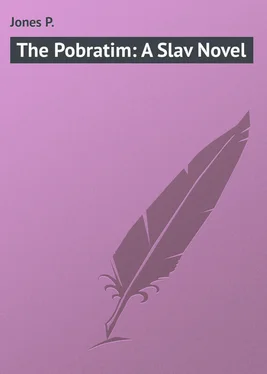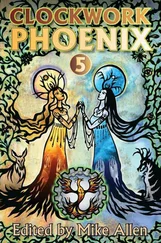P. Jones - The Pobratim - A Slav Novel
Здесь есть возможность читать онлайн «P. Jones - The Pobratim - A Slav Novel» — ознакомительный отрывок электронной книги совершенно бесплатно, а после прочтения отрывка купить полную версию. В некоторых случаях можно слушать аудио, скачать через торрент в формате fb2 и присутствует краткое содержание. Жанр: Прочие приключения, foreign_prose, на английском языке. Описание произведения, (предисловие) а так же отзывы посетителей доступны на портале библиотеки ЛибКат.
- Название:The Pobratim: A Slav Novel
- Автор:
- Жанр:
- Год:неизвестен
- ISBN:нет данных
- Рейтинг книги:3 / 5. Голосов: 1
-
Избранное:Добавить в избранное
- Отзывы:
-
Ваша оценка:
- 60
- 1
- 2
- 3
- 4
- 5
The Pobratim: A Slav Novel: краткое содержание, описание и аннотация
Предлагаем к чтению аннотацию, описание, краткое содержание или предисловие (зависит от того, что написал сам автор книги «The Pobratim: A Slav Novel»). Если вы не нашли необходимую информацию о книге — напишите в комментариях, мы постараемся отыскать её.
The Pobratim: A Slav Novel — читать онлайн ознакомительный отрывок
Ниже представлен текст книги, разбитый по страницам. Система сохранения места последней прочитанной страницы, позволяет с удобством читать онлайн бесплатно книгу «The Pobratim: A Slav Novel», без необходимости каждый раз заново искать на чём Вы остановились. Поставьте закладку, и сможете в любой момент перейти на страницу, на которой закончили чтение.
Интервал:
Закладка:
"No, not now. It is better for you to go away and see if you do not forget me. Besides, neither your father nor your mother know anything about me, and it may happen that they have other views about you."
"Their only aim is my happiness."
"Still, they might think that you were wheedled – "
"How could they think so ill of you?"
"You forget that they do not know me. Anyhow, it is more dutiful that you should speak to them before you speak to my father."
"Well, perhaps you are right. Only, you see, I love you so; I should be so frightened to lose you."
"It is not likely that anybody will think of me for some years yet."
"Well, then, promise me not to marry anyone else. In a year's time, then, I shall come and speak to your father. Will you promise?"
"I promise."
"Will you give me a pledge?"
She gave him her hand, but he gently pulled her towards him, clasped her in his arms, and kissed her rosy lips. Then they both went into the house.
CHAPTER VI
THE BULLIN-MOST
"I suppose you have been to Knin and Dernis?" said the captain by chance after dinner to his host, speaking about the trade with the interior, whilst puffing away at the long stem of his cherry-wood pipe.
"Of course. Haven't you?"
"Oh, no! we sailors are always acquainted with the coasts of countries, nothing more. What kind of a place is this Knin?"
"Much of a muchness, like other places. The country, however, is fine and picturesque. There is, besides, the Bullin-Most."
"What is that?"
"The name of a bridge at the entrance of the town, and almost at the foot of the fortress which tops the crags. It is called the Bullin-Most, or the Bridge of the Turkish Woman. Formerly it used to be called the Bridge of the Two Torrents."
"Well, and what is there remarkable about it?"
"Don't you know the tale of 'Hussein and Ayesha'?"
"No."
"It is the subject of one of Kacic's finest poems. Would you like to hear it?"
"Of course."
"Well, then, about two hundred years ago, more or less, Kuna Hassan was the governor of Knin and of the neighbouring province. The Aga was said to be a man of great wisdom and courage; but his many qualities were marred by his severity towards the Christians, whom he hated, and subjected to all kinds of vexations and cruel treatment.
"This Aga had a numerous family, being blessed with many children by his several wives; but Ayesha, the only daughter of his favourite wife, was the child in whom he had put all the fondness of his heart. She was, it is true, a girl of an extraordinary beauty. Her skin, they say, was as white as the snowy peaks of the Dinara, the mountain over against the fort of Knin; her eyes were black, but they sparkled softly, like the star which shines at twilight; her curly hair had the colour of the harvest moon's mellow light.
"All the vati of her father's palace were in love with her, only hearing her beauty extolled by the eunuchs of the harem, and seeing her glorious eyes sparkle through her veils, or the tips of her tapering fingers, as she held her feredgé .
"The principal lords of Kuna Hassan Aga's Court were, first, Ibrahim Velagic, the Dizdar of Stermizza; then Mujo Jelascovic, the governor of Biscupia; lastly old Sarè the Bulju Pasha , or lieutenant of the troops. The old Sarè had a son named Hussein, who was the standard-bearer; he was the most beautiful young man of the land, nay, it was difficult to find his like. He was, indeed, as handsome as Ayesha was comely. The one was like a lily, the other like a pomegranate flower.
"At that time, as I have said before, the Christians were groaning under the Turkish yoke, and several attempts had already been made to shake it off; nay, many of the struggles which had taken place between the Turks and the men of the Kotar had been most successful, as they had for their chief, Jancovic Stoyan, or Stephen, known in history as 'the clearer of Turkish heads.' These continual skirmishes had weakened our oppressors in such a way, and spread so much fear amongst them, that Kuna Hassan never felt sure whenever he left his castle walls. Finding himself reduced to this extremity, he determined to muster all the troops he could get together and make war upon the Christians.
"And now," said Giulianic, "I think I can give you some of Kacic's verses on this subject;" therefore, taking a guitar, he sang as follows:
"A letter wrote Hassan Aga
From Knin itself, the white-walled town;
He sent it to the bordering Turks,
To Mujo and to Velagic.
"And in this letter Kuna spake:
'Oh! brave men of my border-lands,
Now muster all your borderers,
And hie to Knin, the white-walled town.
"'For we shall raid upon Kotar,
And there rich plunder shall we get
Both gold and young Molachian maids,
Shall be the prize of all the brave.
"'Kotar will be an easy prey
For you, the warriors of the Cross!
Besides, the Sirdars are away,
And Stoyan is in Venice now.
"'Milikovic has fallen sick,
Mocivana has lost his horse,
Mircetic has sprained his hand,
And Klana to a feast is gone.'
"The Bulju Pasha heard all this,
And wisely answered to Kuna:
'Forbear, Kuna Aga; forbear
To make a raid upon Kotar!'"
Giulianic stopped to take breath. "The poem is long," said he, "and I am old; I shall relate the story in my own words: – Well, Kuna Hassan Aga would not be dissuaded, especially as the Dizdars were for it. The expedition took place. Jelascovic and Velagic – called the snakes of the empire, on account of their strength and craft – came to Kuna's castle, bringing each man three hundred men with him. The Aga mustered as many men himself, and with this little array they set off for the Kotar. At first they were successful; they fell upon the open country, plundering and sacking, carrying away young boys and girls as slaves, finding nowhere the slightest opposition. It was not a war, but a military march; thus they went on until they reached the lovely meadows at the foot of the hills of Otre, a most pleasant country, watered by many rivulets.
"There they pitched their tents, and began to prepare their meal and make merry. All at once as the sun went down, a slight mist began to rise from the waters and from the marshes of Ostrovizza, not very far off from there. As the day declined, the fog grew denser, and when night came on Jancovic Stoyan, who had returned from Venice, together with the other Sirdars , fell upon them, threw them upon the marshes, and not only obliged them to give back all their plunder, but killed more than six hundred of their men. It was only with great difficulty that the Aga and Dizdars got back to Knin; they were all in a sorry plight, regretting deeply not to have followed Sarè's advice.
"Shortly after this, Kuna Hassan, having recovered from the wounds he had received, gathered again all his chief warriors together. Then he made them a long speech, saying that it was time that the Christian hornets should be done away with, and their nests destroyed, for, if left alive, they would daily become more troublesome; then he made them many promises, so as to induce them to fight, but without much success. At last he offered the hand of his handsome daughter, who, as I have said, was indeed as beautiful as a heavenly houri, and a bride fit for the Sultan, or the Prophet himself, to the bold warrior who would bring him the head of Jancovic Stoyan, or those of the three hundred Christians. The prize he requested was a great one, but the reward he offered was such as to inflame the hearts of the greatest cowards.
Читать дальшеИнтервал:
Закладка:
Похожие книги на «The Pobratim: A Slav Novel»
Представляем Вашему вниманию похожие книги на «The Pobratim: A Slav Novel» списком для выбора. Мы отобрали схожую по названию и смыслу литературу в надежде предоставить читателям больше вариантов отыскать новые, интересные, ещё непрочитанные произведения.
Обсуждение, отзывы о книге «The Pobratim: A Slav Novel» и просто собственные мнения читателей. Оставьте ваши комментарии, напишите, что Вы думаете о произведении, его смысле или главных героях. Укажите что конкретно понравилось, а что нет, и почему Вы так считаете.












